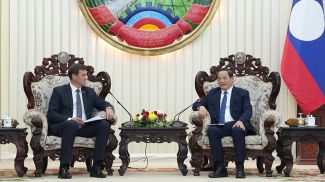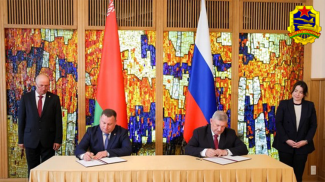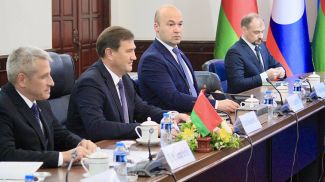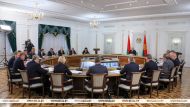MOSCOW, 7 July (BelTA) – Collaborationists from Latvia, Lithuania, and Ukraine committed multiple atrocities in Belarus during the Great Patriotic War. Belarus' Prosecutor General Andrei Shved made the statement during a conference of heads of prosecution services of European countries in St Petersburg on 7 July, BelTA has learned.
The conference was organized by the Office of the Prosecutor General of Russia in association with the Council of Europe and the International Association of Prosecutors (IAP). During the conference Andrei Shved presented a report on protecting rights of the individual and the society in connection with an investigation into the genocide of the BSSR population during the Great Patriotic War of 1941-1945. The official said: “I would like to stress that collaborationist units made of nationalists from Latvia, Lithuania, and Ukraine participated in the genocide of the civilian population. The 12th Lithuanian battalion alone slaughtered over 10,000 civilians in Minsk Oblast in 1941. Multiple facts of joint participation of Lithuanian and Latvian battalions in punitive operations against civilians in 1942 and later on were registered. In particular, in February-March 1943 they participated in the punitive operation Winter Magic (Winterzauber). The purpose of the operation was to create a ‘dead land' strip 30-40km wide along the Latvian border. As part of the operation 387 populated localities were eliminated, over 13,000 civilians were killed, and over 7,000 people were taken for compulsory labor outside the country. For instance, the population of the village of Trodovichi, including women and children, was locked in one house, which was set on fire. Trying to escape the fiery death, the people ran out of the house only to be shot and blown up with grenades. All the residents of the village were killed. Another 114 populated localities were burned down in that period.”
According to archive documents, Latvian police units also took part in the punitive operation Spring Festival (Fruhlingsfest), which took place 11 April – 4 May 1944 and targeted partisans and civilians in Lepel District in Belarus. Recorded testimonials of witnesses of those events say that Latvian SS troops demonstrated particular cruelty towards civilians. When asked why hundreds of unburied bodies of murdered women, elderly, and children were lying outside a village, soldiers of the Latvian SS units said they had killed them in order to eliminate as many Russians as possible. All the Slavonic nations were perceived as Russians. Witnesses saw bodies of about 3,000 civilians – children, elderly, and women – in a ravine near the village of Kobylniki, Vitebsk Oblast in early May 1944. “We are starting examining the site now,” Andrei Shved said.
According to the prosecutor general, the criminal case they are investigating contains information that a sufficient number of surviving murderers still lives in Latvia, the USA, the UK, Australia, and other countries. “Their involvement in acts of genocide of Belarusian civilians is being checked,” the prosecutor general noted. “The investigation team also has personnel rosters of a number of Latvian and Lithuanian punitive battalions. Thousands of names. We are now checking whether they are alive or not and where they live. If we find this information, we will contact the relevant justice authorities with a request to carry out the necessary investigative actions and verify their involvement in the genocide of the Belarusian people,” Andrei Shved said.
According to the prosecutor general, within the framework of international cooperation requests for legal aid have been sent to Lithuania, Latvia, the UK, the USA, Canada, Australia, Argentina, Brazil, Israel, and other countries. If the involvement of specific individuals in the genocide of Belarusian civilians is verified, steps will be taken in line with international agreements on cooperation in criminal cases in order to bring them to justice.
Andrei Shved continued: “The investigation into the genocide of the Belarusian people during the Great Patriotic War is definitely a tribute to the memory of the fallen. It contributes to historical justice. It is designed to protect interests of Belarusians as a social community and thus the public process, which reflects private interests of murdered innocent Belarusian citizens and their descendants. We are intent on realizing the antifascist principle ‘Never again'. We thought the brown plague was history but today's reality demonstrates that we cannot forget it. We place a high priority on the investigation of the criminal case. If we can, we will keep all the international institutions informed, including the prosecutors general of the European countries, whom we will send the full package by the end of the year. The package will contain indisputable facts documented using modern forensic science methods to prove the mass slaughter of not only Belarusians but people of the Soviet Union. We will demonstrate the link between Nazi criminals and their descendants, who committed crimes back then, with the crimes being committed nowadays.”













